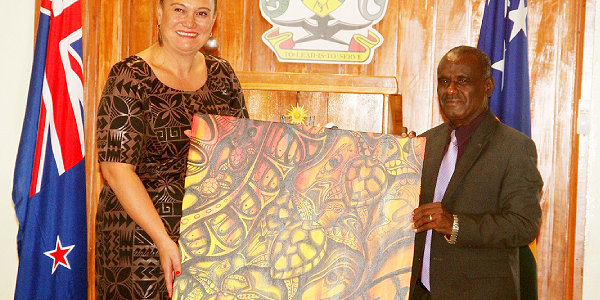THE Minister of Foreign Affairs and External Trade, Jeremiah Manele, had a successful bilateral discussion with the Deputy Prime Minister and Associate Minister of Foreign Affairs of New Zealand, Carmel Sepuloni on Monday.
During the bilateral meeting, Minister Manele acknowledged the government and people of New Zealand for their unwavering support to Solomon Islands over the years.
He said New Zealand is a Pacific neighbour and valued partner that assisted Solomon Islands in development across many areas such as education, fisheries, aviation, labour mobility, youth empowerment, social inclusion and addressing climate change.
Minister Manele expressed gratitude to the New Zealand Government for its COVID-19 assistance of about SBD $83.6 million. New Zealand was amongst the first countries to respond Solomon Islands call for help, whilst dealing with its own COVID-19 challenges. The funding provided by New Zealand cushioned the impacts of the global pandemic on the health sector and in other sectors as well.
Amongst key issues discussed was Infrastructure and economic development partnership. Minister Manele highlighted that the Bina Harbour project is important for Solomon Islands and that much progress has been made, particularly on the acquisition of land for the project.
The Bina Harbour Tuna Processing Plant (BHTPP) Project will be the second tuna processing plant in the country and is expected to trigger economic benefits for both Malaita Province and the country.
Minister Manele also acknowledged the progress made in the upgrading of provincial airstrips at Taro in Choiseul Province and Seghe in the Western Province which are co-funded by the governments of Solomon Islands, New Zealand and Australia.
The provincial airport upgrade programme is a key policy deliverable of the Democratic Coalition Government for Advancement and these upgrades will improve safety, compliance and all-weather operations and support tourism.
Minister Manele also expressed that Solomon Islands recognises New Zealand’s vast experience in geothermal energy and would like to see it assist Solomon Islands develop its energy sector as the country has the highest cost of electricity anywhere in the world and that only 20 percent of its population are connected to the grid.
He also spoke of Labour Mobility as a key aspect of the Solomon Islands – New Zealand partnership and that the Recognised Seasonal Employer (RSE) scheme is a win-win for both countries.
Minister Manele said Solomon Islands has a huge labour supply and anticipates that New Zealand would remove the cap limit of workers sent to New Zealand through the RSE scheme and have the scheme expanded to other sectors such as construction and fisheries and also embrace semi and skilled workers.
He also acknowledged the support provided by New Zealand as a key partner in the education sector as Solomon Islands benefits from New Zealand’s support in education infrastructure as well as tertiary scholarships.
On security, Minister Manele informed the New Zealand Deputy Prime Minister and Associate Foreign Minister that Solomon Islands remains focused on managing and addressing its domestic risks and threats.
“The November 2021 riots tested our law enforcement capacities, and highlighted the challenges with managing law and order. When Solomon Islands triggered the Australia – Solomon Islands Security Treaty, New Zealand stood in solidarity with the Solomon Islands and contributed by deploying its Defence Force and Police personnel under the Treaty to address the law-and-order situation. Your contribution to the Solomon Islands International Assistance Force (SIAF) in maintaining peace and stability after the November 2021 riots is acknowledged,” he said.
Minister Manele also stated that Solomon Islands is cognizant of the growing militarisation in the region and as a party to the Rarotonga Treaty, it remains a nuclear-free state, given the Pacific legacy of being testing sites of nuclear weapons, dumping grounds for nuclear waste and nuclear storage.
On Solomon Islands graduation from the Least Developed Country (LDC) status, Minister Manele acknowledged New Zealand’s support for Solomon Islands request to extent its graduation.
“As Solomon Islands works towards graduation from LDC, it is important to be fully prepared so that once the country graduates from LDC, it is not reversible but one that is progressive and advanced for the betterment of the country as far as development is concern.”
Minister Manele also raised the issue of reciprocal visa arrangements to enhance people-to-people connection and relations. Currently, New Zealanders are given visa on arrival when entering the country, unlike Solomon Islanders who require a visa to travel to New Zealand.
“Over the years, we have been calling for reciprocal visa arrangements and I am making the call again and hope can make progress work on this.”
Mnister Manele concluded his bilateral meetings with the New Zealand Deputy Prime Minister and Associate Foreign Minister with the presentation of gifts and a joint Press Conference with local and visiting New Zealand journalists.









